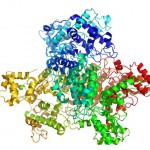What Poverty Does to Our Genes

Cole’s work carries all kinds of implications — some weighty and practical, some heady and philosophical. It may, for instance, help explain the health problems that so often haunt the poor. Poverty savages the body. Hundreds of studies over the past few decades have tied low income to higher rates of asthma, flu, heart attacks, cancer, and everything in between. Poverty itself starts to look like a disease. Yet an empty wallet can’t make you sick. And we all know people who escape poverty’s dangers. So what is it about a life of poverty that makes us ill?
Cole asked essentially this question in a 2008 study he conducted with Miller and Edith Chen, another social psychologist then at the University of British Columbia. The paper appeared in an odd forum: Thorax, a journal about medical problems in the chest. The researchers gathered and ran gene-expression profiles on 31 kids, ranging from nine to 18 years old, who had asthma; 16 were poor, 15 well-off. As Cole expected, the group of well-off kids showed a healthy immune response, with elevated activity among genes that control pulmonary inflammation. The poorer kids showed busier inflammatory genes, sluggishness in the gene networks that control inflammation, and — in their health histories — more asthma attacks and other health problems. Poverty seemed to be mucking up their immune systems.
David Dobbs has a fascinating story in the new issue of Pacific Standard, which examines how the environment we live in, the support systems we have, and our feelings of loneliness change the way our genes express themselves. Meaning, each of us comes with a blueprint of genes, but researchers like Steve Cole, a Professor of Medicine and Psychiatry and Biobehavioral Sciences at the UCLA School of Medicine, has found that some genes turn off and on like a dimmer switch depending on the activity in our environment. This is known as gene expression. Genes switch on to heal wounds and fight infection. Gene expression can determine what we look like. Dobbs writes: “When it comes down to it, really, genes don’t make you who you are. Gene expression does. And gene expression varies depending on the life you live.”
And as you can see in the excerpt above, there are links to how an environment of poverty affects the kind of gene expression that results in a healthy immune system — especially if those who live in poverty lack a family support system. Dobbs also examines Cole’s “lonely people study,” which showed that lonely people were more likely to have weaker immune systems than people who had a support system of family and friends. Of course, a lot of this is fairly new scientific work that has been done just in the last few decades, but the implications of the work are very interesting.
Photo: Wikimedia Commons
Support The Billfold
The Billfold continues to exist thanks to support from our readers. Help us continue to do our work by making a monthly pledge on Patreon or a one-time-only contribution through PayPal.
Comments